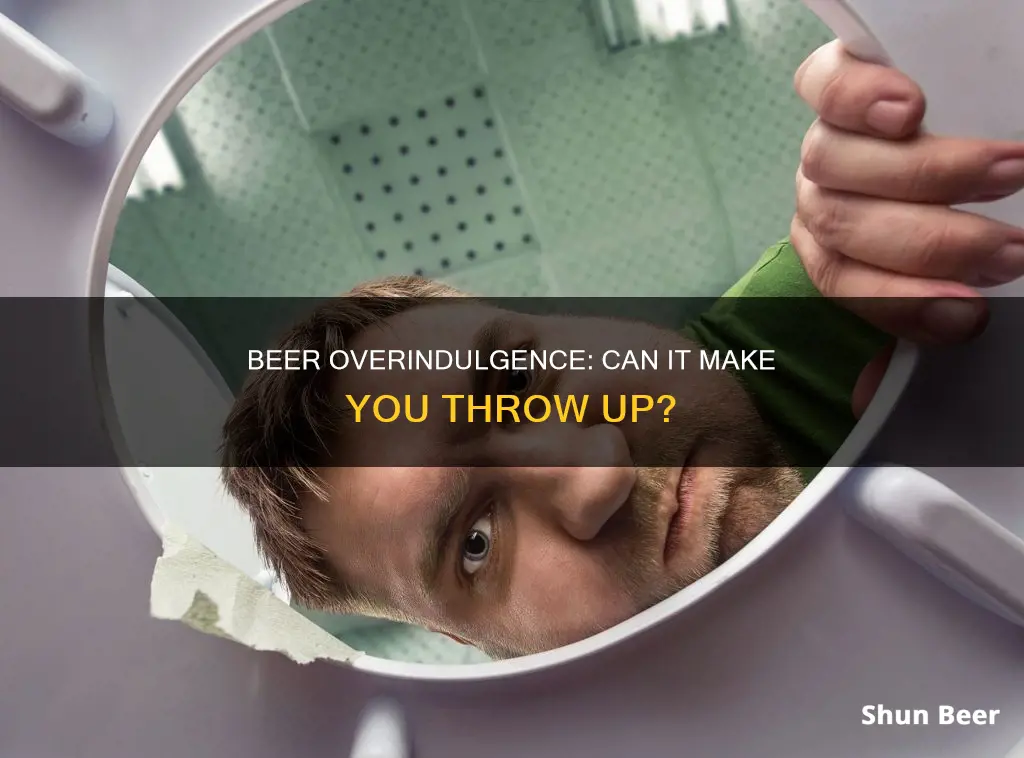
Throwing up after drinking beer or any other alcoholic beverage is the body's natural mechanism to remove harmful substances. When you drink alcohol, your body breaks it down into acetaldehyde, a toxic by-product. If you drink too much, your liver won't be able to keep up with breaking down the acetaldehyde, and you will start to feel drunk. Excess alcohol can also irritate the stomach lining, causing a buildup of acid that leads to nausea and vomiting. While throwing up can help relieve these unpleasant symptoms, it is important to rehydrate and rest afterward to prevent complications such as dehydration, which can be dangerous.
| Characteristics | Values |
|---|---|
| Why you throw up | Excessive alcohol consumption leads to a buildup of acetaldehyde, a byproduct of alcohol, in the body. The liver can't keep up with the high levels of acetaldehyde and gets rid of it through vomiting. |
| What to do after throwing up | Sip water or other clear liquids, eat small bites of bland food, get plenty of rest, and take an over-the-counter pain reliever. |
| Risks of throwing up | Dehydration, damage to the esophagus, acid reflux, tooth damage, aspiration (stomach contents going into the lungs), electrolyte imbalance, malnutrition, and gastrointestinal issues. |
| When to see a doctor | If you've been throwing up for more than 24 hours, can't keep fluids or food down, have signs of dehydration, see blood in your vomit, have trouble breathing, or have a fever. |
What You'll Learn

Alcohol intolerance
People with alcohol intolerance may experience these symptoms regardless of the type of alcoholic beverage they consume, be it beer, wine, or hard liquor. The condition poses serious health risks, including an increased probability of developing cancers of the mouth, throat, esophagus, stomach, and liver. It is also associated with a higher risk of heart disease and stroke.
The only way to prevent the uncomfortable reactions caused by alcohol intolerance is to avoid alcohol or the specific substances that trigger the intolerance. In some cases, reactions may be triggered by an allergy to ingredients in alcoholic beverages, such as grains, sulfites, or preservatives. Combining alcohol with certain medications can also cause adverse reactions.
It is important to distinguish between alcohol intolerance and alcohol allergy. While alcohol intolerance is a digestive system disorder, an alcohol allergy is an immune system response to the ingredients in alcoholic beverages. Allergic reactions to alcohol can cause symptoms such as difficulty breathing, coughing, a runny nose, or stomach upset. These symptoms may be triggered by even a small amount of alcohol and are the result of the body creating antibodies against allergens.
If you experience any of the symptoms associated with alcohol intolerance or allergy, it is recommended to consult a doctor, especially if you are unsure of the cause. While alcohol intolerance itself is not typically serious, ignoring its symptoms and continuing to consume alcohol can lead to severe health complications.
Non-Alcoholic Beer: Safe for Liver Disease Patients?
You may want to see also

Alcohol poisoning
Drinking too much beer, or any alcoholic drink, can lead to vomiting as the body's natural mechanism to remove harmful substances. Throwing up can prevent alcohol poisoning, which is a potentially fatal consequence of drinking too much alcohol over a short period.
Symptoms
- Mental confusion or slurred speech
- Poor coordination or stumbling
- Trouble staying awake
- Slow or irregular breathing (less than eight breaths per minute or a gap of more than 10 seconds between breaths)
- Low body temperature
- Passing out or blacking out
- Seizures
- Clammy skin
- Dulled responses, such as no gag reflex
- Bluish, gray, or pale skin
Causes
Binge drinking is a major cause of alcohol poisoning. Binge drinking is defined as drinking that brings blood alcohol concentration (BAC) to 0.08% or higher. For men, this typically involves consuming five or more drinks in about two hours, and for women, it's four or more drinks in the same time frame.
Complications
- Choking on vomit
- Trouble breathing due to vomit in the lungs
- Permanent brain damage
- Death
Prevention
To prevent alcohol poisoning, it is recommended to:
- Drink in moderation. Men should have no more than two drinks a day, and women should have only one.
- Alternate alcoholic drinks with non-alcoholic ones, preferably water.
- Avoid drinking on an empty stomach. Food slows down alcohol absorption to some extent.
- Avoid drinking while taking prescription medications or other drugs, as some interact dangerously with alcohol.
- Avoid drinking games, funnels, or beer bongs.
- Store alcohol safely, especially if there are children or teens in the household.
Treatment
If you suspect someone is experiencing alcohol poisoning, take the following steps:
- Call emergency services immediately.
- Keep the person awake and seated upright.
- If they are conscious, have them sip water.
- Cover them with a warm blanket.
- If they are unconscious, place them on their side to prevent choking on vomit.
- Inform the paramedics about their symptoms and how much they drank.
The Magic of Appearing Beer: Trick Explained
You may want to see also

Alcohol gastritis
The risk factors for developing alcoholic gastritis include heavy drinking, binge drinking, and long-term alcohol consumption. However, it is difficult to predict exactly how much alcohol can cause alcoholic gastritis as it depends on individual health status and body chemistry. Other factors that can worsen alcoholic gastritis include the use of aspirin and non-steroidal anti-inflammatory drugs (NSAIDs), spicy foods, cigarette smoking, certain illegal drugs, and chronic stress.
The treatment for alcoholic gastritis involves quitting alcohol and using medications to control gastric inflammation. Medications that may be prescribed include antibiotics, antacids, H2 blockers, and proton pump inhibitors. Doctors may also recommend lifestyle changes during treatment, such as eating smaller meals, avoiding spicy or acidic foods, and quitting smoking.
If left untreated, alcoholic gastritis can lead to serious complications, including gastrointestinal tract bleeding, anemia, peptic ulcers, gastric polyps, and stomach tumors. Therefore, it is important to seek medical attention if you are experiencing any symptoms of alcoholic gastritis.
Drinking Beer in Tennessee Grocery Stores: Is it Allowed?
You may want to see also

Dehydration
Drinking beer excessively can lead to dehydration. Alcohol is a diuretic, which means it increases urine output. Beer has a fairly low alcohol by volume (ABV) of 2% to 6%, but the amount of alcohol in beer determines its diuretic effect and, therefore, how much it can dehydrate you.
A study comparing beer, wine, spirits, and their non-alcoholic counterparts found that stronger alcoholic drinks have a short-term diuretic effect. However, urine output after drinking a typical beer was no different from that of a non-alcoholic beer or water. Several other studies have concluded that beer might actually hydrate us adequately. These studies do warn that stronger beers are likely to be more dehydrating, and drinks containing electrolytes are better for hydration.
Alcohol inhibits the release of the anti-diuretic hormone vasopressin, which causes the kidneys to save water instead of passing it as urine. This leads to losing too much water and becoming dehydrated.
Stale Beer: Is It Safe to Drink?
You may want to see also

Gastrointestinal issues
Drinking beer or any other form of alcohol can lead to gastrointestinal issues. The National Institute of Diabetes and Digestive and Kidney Diseases (NIDDK) notes that drinking alcohol can damage the stomach lining with or without inflammation. This can lead to gastrointestinal complications, such as:
- Gastritis: This refers to inflammation of the stomach lining due to alcohol consumption. Alcohol can disrupt the mucus that covers the stomach lining, causing stomach acid to disrupt surrounding cells. This can cause bleeding and may make you throw up. People with alcohol-related gastritis may experience frequent stomach-related concerns, such as acid reflux, nausea, and ulcers.
- Gastropathy: Alcohol can cause or worsen this condition, which is characterised by a weakened stomach lining.
- Peptic Ulcers: Excessive alcohol consumption can irritate the stomach lining and lead to the formation of ulcers.
- Stomach Cancer: Chronic alcohol exposure is linked to an increased risk of stomach cancer.
In addition to these specific gastrointestinal conditions, excessive alcohol consumption can also lead to gastrointestinal bleeding due to irritation or tears in the oesophageal or stomach lining. This can occur when the body tries to get rid of excess toxins through vomiting. Aspiration of vomit into the lungs is another possible complication, which can lead to pneumonia.
Beer Headaches: Why It Happens and What to Do
You may want to see also
Frequently asked questions
Drinking alcohol can irritate the stomach lining and cause a buildup of acid that makes you feel nauseated. Beer contains an ingredient that may be causing an allergic reaction, such as yeast or hops.
Throwing up is your body's way of getting rid of toxins. It can help relieve symptoms of excess alcohol in the bloodstream and make you feel better.
Throwing up from drinking can cause serious health problems, including damage to the esophagus, tooth damage, acid reflux, and aspiration (when stomach contents go into your lungs).
There is no way to stop throwing up after drinking as it is your body's natural response to excess alcohol. However, you can help yourself feel better by staying hydrated, getting plenty of rest, and eating small amounts of bland food.







